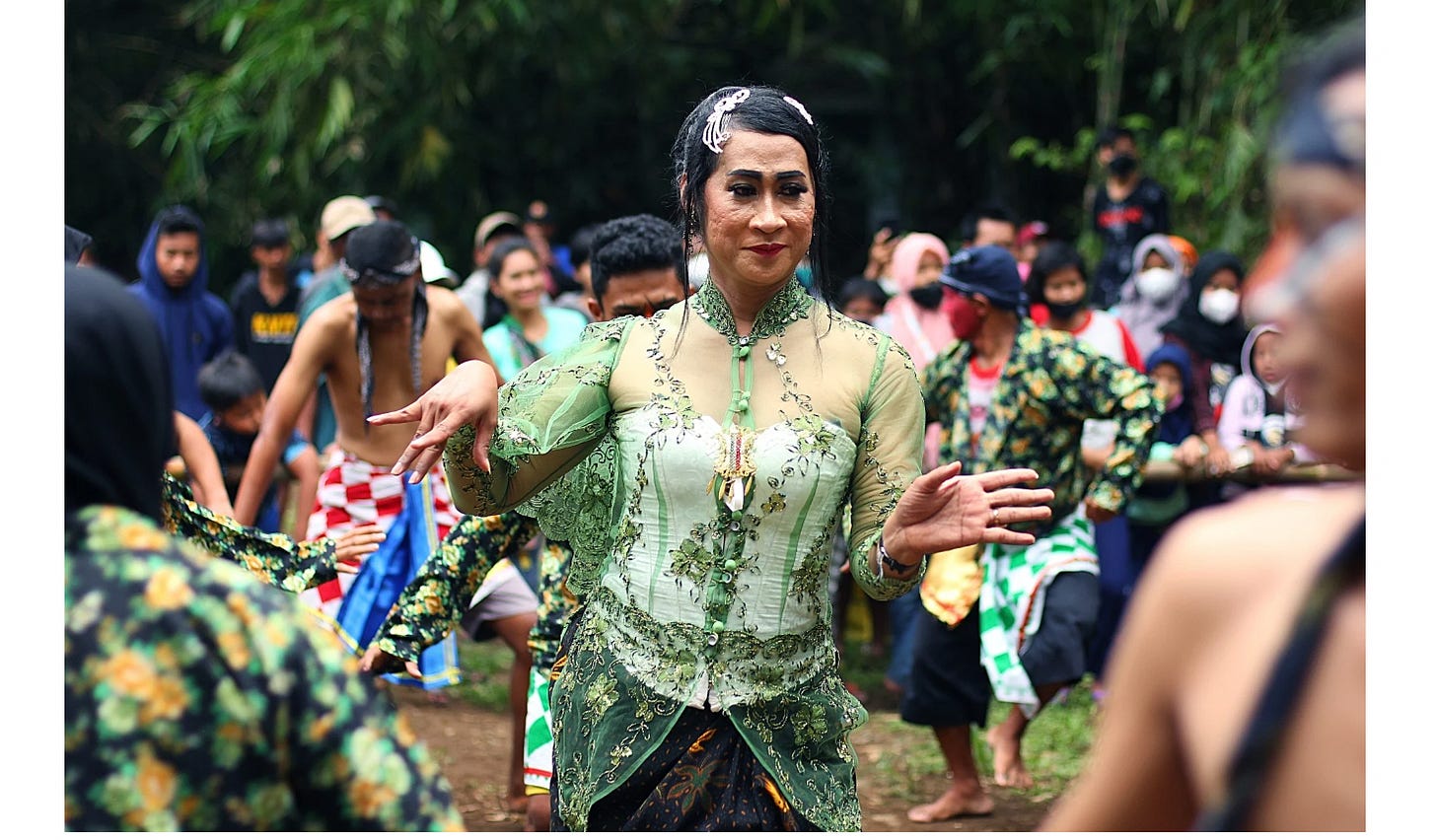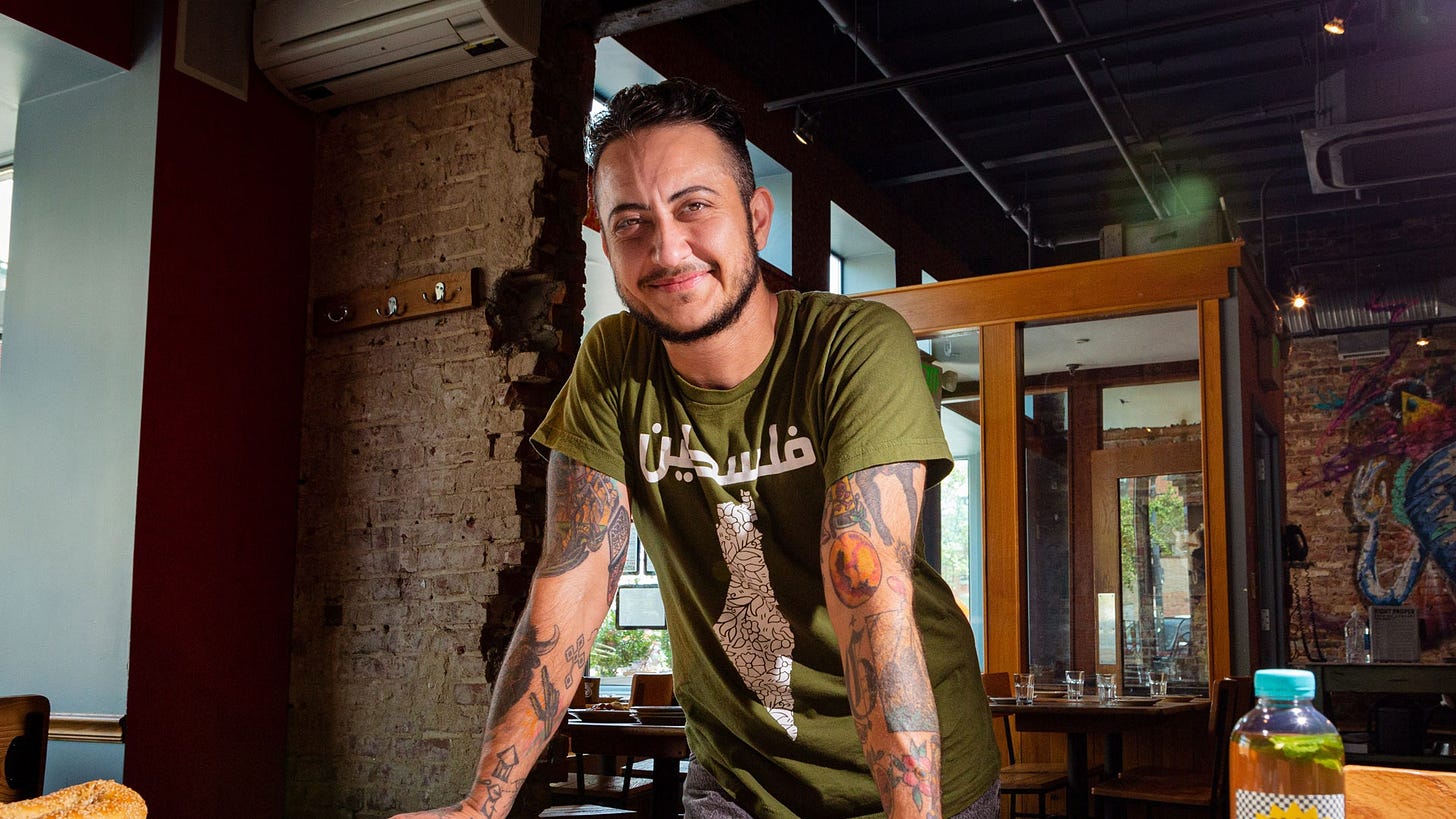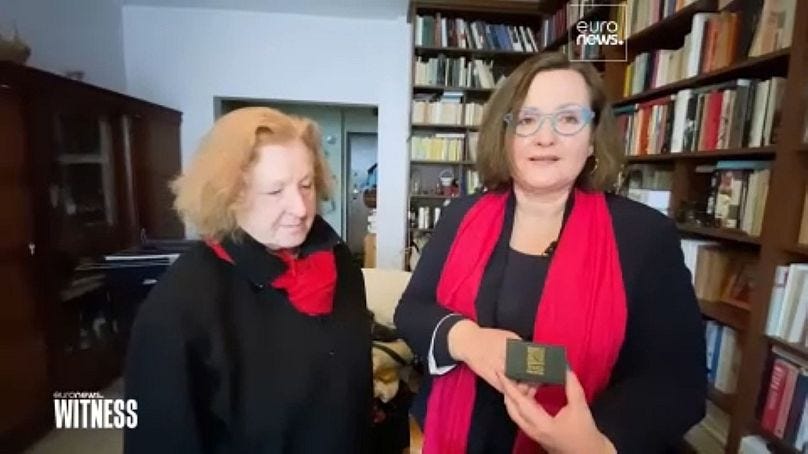Global Roundup: Indonesia Trans Women & Climate Change, Trans Palestinian American Chef, Hong Kong LGBTQ Activists, Poland LGBTQ+ Community, Roma Women in Ukraine
Curated by FG Contributor Samiha Hossain
A transgender person performs at an arts festival in Central Java. Many Indonesian trans women work in occupations that rely on them being able to solicit clients outdoors. Photo: Shutterstock
Joya Patiha, a 43-year-old trans woman, first started to notice that changing weather patterns in the mountain-ringed city of Bandung were affecting her income as a sex worker a decade ago. The rainy season was lasting longer across the West Java province, winds were stronger and in some particularly bad years Patiha lost up to 80 per cent of her earnings.
No one is coming out during the longer rainy season. It is very hard to make money during that unpredictable weather. -Joya Patiha
Many trans women, like Patiha, are shut out of the formal economy and survive as buskers and sex workers, occupations that rely on them being able to solicit clients outdoors. Sherly Wijayanto, a 28-year-old trans woman from the capital Jakarta, worked as a busker for around seven years until the increasingly volatile weather made her seek other options. Wijayanto joined trans-led arts group Sanggar Seroja, where she now sings with the theatre company and runs the social media channel.
LGBTQ individuals are sometimes blamed for problems related to climate change as they are labelled as ‘deviant,’ according to Arif Budi Darmawan, a researcher at the Bandung-based Resilience Development Initiative. These kinds of attitudes have seen LGBTQ people excluded from plans meant to support Indonesians dealing with the effects of climate change, he said.
The Indonesian government has a five-year plan setting out its development objectives and how it will manage the impacts of climate change and although this includes provisions for vulnerable groups, trans people are not listed among them. Some trans women are seeking to find their own solutions. To raise awareness about climate change, Sanggar Seroja puts on film nights and fashion shows, and hosts discussions with other queer communities. The group also surveyed 80 members of the trans community in Jakarta to find out how climate change affected incomes, frequency of illness, and changes in spending from 2021 to 2022. Nearly 93 per cent of respondents saw decreased income during the rainy season, and 72 per cent had increased expenses.
Photo: Farrah Skeiky
Marcelle G Afram, a 39-year-old trans Palestinian American chef, has worked in restaurant kitchens for nearly two decades in the heart of Washington, D.C. In 2021, they launched Shababi, a pop-up catering business that has allowed them to share the Palestinian cuisine and Arab-American hospitality they have been steeped in since childhood.
I try to utilize the resources that are around us to give us the flavors of home. And in respect of the Palestinian relationship to the land, I try to source as locally as possible and be super veg forward, highlighting what the season has to offer. -Marcelle G Afram
Living in the diaspora, Afram carries a responsibility to preserve the culinary and cultural knowledge his family brought with them across thousands of miles and seven decades.
My grandparents were exiled [from Palestine] in 1948, so I’m three generations removed from the homeland. I'm cooking based on the recipes of memories and my translation of them. -Marcelle G Afram
From the outset, Afram oriented the pop-up and its platform around the celebration of Palestinian cuisine and advocating for Palestinian liberation from Israeli occupation. Through collaboration dinners, Afram has channeled humanitarian relief for refugees in Gaza, raising funds for UNRWA USA. In preparing and serving Palestinian food, Afram calls attention to the harsh reality that Palestinians in Gaza are being starved to death by the Israeli blockade and violently cut off from access to food that sustains them. For instance, not only does the Israeli government restrict Palestinian movement such that farmers need travel permits to work on their own land, but the Israeli government has gone so far as to ban the foraging of wild herbs including za’atar and akkoub.
Afram and fellow Palestinian chefs launched Hospitality for Humanity with community organizers Ora Wise and Kimberly Chou Tsun An of FIG, a Brooklyn-based food equity collective. Together, they co-authored a pledge for food and hospitality industry workers to publicly demand a ceasefire and to support the BDS movement. The pledge has garnered 1,177 signatures. They also created a digital toolkit to compile action items and provide education on Israel’s weaponization of food and hunger against Palestinians.
Afram’s redoubled boldness to stand out as Palestinian and to speak up with a chorus of other Arab Americans is a change they credit to embracing their transness and no longer defaulting to assimilation — even if it means risking rejection.
My self-expression as Palestinian came about because I found myself as a trans person. I was so far removed from my identity even as an Arab person, so this evolution has a lot to do with me unlearning the biases that were impressed on me as I am reclaiming my narrative. -Marcelle G Afram
In the movement for a free Palestine, Afram has found community with others who organize not in spite of being queer but because of it. They find hope in the determination of their people to survive and the dedication to keep showing the world the truth.
Supporters of LGBT rights take part in the annual pride parade in Hong Kong, China November 25, 2017. REUTERS/Bobby Yip/File Photo
The Court of Final Appeal last February unanimously sided with appeals launched by transgender activists that barring transgender people from changing their gender on their mandatory ID cards unless they undergo full sex reassignment surgery violates their rights. The court ruling for activist Henry Tse and another appellant identified as Q was hailed as a victory for transgender rights in Hong Kong.
The revised requirements include the removal of breasts for transgender men, and removal of penis and testes for transgender women, which some activists say are too extreme. They must also undergo continuous hormonal treatment for at least two years before the gender change ID application is made. Tse's legal representative, Wong Hiu Chong, said in a statement that they welcomed the revised policy but they are "concerned about the heavy emphasis on undergoing blood tests and submission of blood reports on hormone levels".
Zephyrus Tsang, a director at Quarks, an organisation for transgender youth, said the surgical requirements were "a violation of the rights of physical integrity" of transgender individuals.
Christine Chu, a legal and operation manager at Quarks and a transgender woman, said that the new requirements were particularly unfair for transgender women, as asking them to remove genitalia was "a forced sterilisation".
Publisher Elżbieta (L) with writer Renata (R) holding a box containing their wedding ringsEuronews
The LGBTQ+ community in Poland has long advocated against the erosion of human rights after years of rule-of-law concerns. The country has the worst LGBTQ+ rights record in the European Union. Poland’s new liberal government led by Prime Minister Donald Tusk has promised to address the policies affecting LGBTQ+ people, but activists fear that significant legislative changes will take time because Tusk's government agenda is so full.
You can say whatever you want about the LGBTI community and you won't get punished…What the government agreed on, actually, was that we should definitely amend the Criminal Code in order to make homophobic, transphobic hate speech a crime. And they prepared a bill, that we know for sure, but they are still processing it. -Anna Mazurczak
As it stands, same-sex marriage is not allowed in Poland. Euronews met with a same-sex couple hours before they were due to travel to Denmark to get married. Publisher Elżbieta and writer Renata have been together for three decades however their wedding won't have any legal value in Poland. Members of the LGBTQ+ community also argue that the new law regulating civil partnerships does not go far enough. Karolina and Aleksandra have been together for 12 years but Karolina currently has no rights to her children as she is not the biological mother.
As people who have formed same-sex relationships, we don't only care about having a legal partnership. We care about equality. -Karolina
Moving forward, Poland’s progress on LGBTQ+ rights hinges on coalition politics. The ruling coalition will still need to rely on the support of opposition MPs to reform the laws governing LGBTQ+ rights and abortion because it does not have a majority in parliament. Despite any potential consensus within the coalition, advances in this area remain contingent on the president's approval and the judiciary’s stance.
Photo: UN Women/Ryan Brown
I know how difficult it is to be a Roma woman, because we face discrimination outside the community, but also inside the community. -Anzhelika Bielova
Bielova is from Zaporizhzhia, southern Ukraine, and works in the country's southeastern and western regions. In 2020, she started the Voice of Romni, an association led by Roma women in Ukraine, to support women’s economic empowerment and leadership. With the war in Ukraine in its second year, the organization is working to improve access to humanitarian aid, cash assistance, and economic recovery of Roma and internally displaced Roma women in Ukraine.
In the western part of Ukraine, there are a lot of women in the [Roma] community, who are living in compact settlements, without [heating/cooking] gas or access to clean water. The poverty is really so intense in this community. -Anzhelika Bielova
However, the Roma community is not a homogenous group, cautions Bielova, the needs and experiences differ among different ethnic groups in different regions. This is why the role of grassroots, women-led organizations, such as hers, is critical in making sure that humanitarian aid reaches Roma women, who are often the most marginalized, may not have identification documents to access services, and may lack information on how and where to access support. Her organization offers women’s centres with a room for children with a babysitter.
One of my priorities is combatting gender-based violence. It’s a taboo topic in the Roma community... because it is a patriarchal culture, like many others…My goal is to start this difficult conversation [about gender-based violence] within the Roma community and develop long-term solutions. -Anzhelika Bielova
Bielova dreams of a future where Roma women lead organizations, businesses, and activism.
Samiha Hossain (she/her) is an aspiring urban planner studying at Toronto Metropolitan University. Throughout the years, she has worked in nonprofits with survivors of sexual violence and youth. Samiha firmly believes in the power of connecting with people and listening to their stories to create solidarity and heal as a community. She loves learning about the diverse forms of feminist resistance around the world.








